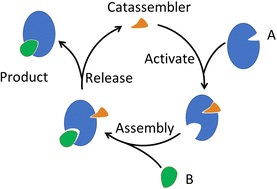我室田中群教授在 Chemical society reviews 上发表论文:What can molecular assembly learn from catalysed assembly in living organisms
摘要:Molecular assembly is the process of organizing individual molecules into larger structures and complex systems. The self-assembly approach is predominantly utilized in creating artificial molecular assemblies, and was believed to be the primary mode of molecular assembly in living organisms as well. However, it has been shown that the assembly of many biological complexes is “catalysed” by other molecules, rather than relying solely on self-assembly. In this review, we summarize these catalysed-assembly (catassembly) phenomena in living organisms and systematically analyse their mechanisms. We then expand on these phenomena and discuss related concepts, including catalysed-disassembly and catalysed-reassembly. Catassembly proves to be an efficient and highly selective strategy for synergistically controlling and manipulating various noncovalent interactions, especially in hierarchical molecular assemblies. Overreliance on self-assembly may, to some extent, hinder the advancement of artificial molecular assembly with powerful features. Furthermore, inspired by the biological catassembly phenomena, we propose guidelines for designing artificial catassembly systems and developing characterization and theoretical methods, and review pioneering works along this new direction. Overall, this approach may broaden and deepen our understanding of molecular assembly, enabling the construction and control of intelligent assembly systems with advanced functionality.

文章链接:https://pubs.rsc.org/en/content/articlelanding/2024/cs/d3cs00634d